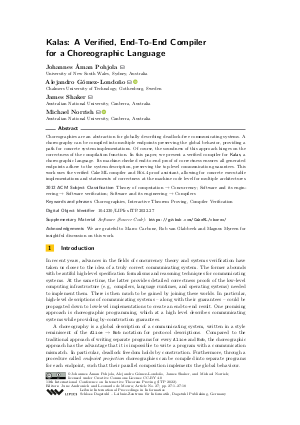@InProceedings{pohjola_et_al:LIPIcs.ITP.2022.27,
author = {Pohjola, Johannes \r{A}man and G\'{o}mez-Londo\~{n}o, Alejandro and Shaker, James and Norrish, Michael},
title = {{Kalas: A Verified, End-To-End Compiler for a Choreographic Language}},
booktitle = {13th International Conference on Interactive Theorem Proving (ITP 2022)},
pages = {27:1--27:18},
series = {Leibniz International Proceedings in Informatics (LIPIcs)},
ISBN = {978-3-95977-252-5},
ISSN = {1868-8969},
year = {2022},
volume = {237},
editor = {Andronick, June and de Moura, Leonardo},
publisher = {Schloss Dagstuhl -- Leibniz-Zentrum f{\"u}r Informatik},
address = {Dagstuhl, Germany},
URL = {https://drops-dev.dagstuhl.de/entities/document/10.4230/LIPIcs.ITP.2022.27},
URN = {urn:nbn:de:0030-drops-167368},
doi = {10.4230/LIPIcs.ITP.2022.27},
annote = {Keywords: Choreographies, Interactive Theorem Proving, Compiler Verification}
}

 Creative Commons Attribution 4.0 International license
Creative Commons Attribution 4.0 International license
